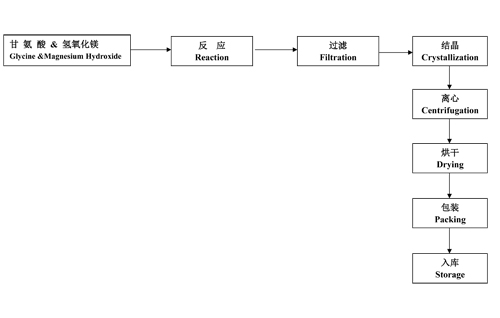sdfsd
Magnesium bisglycinate
|
Technical Data Sheet
Net weight: 25kgs/Drum or Carton Gross weight: 27.5Kgs±0.5kg/Drum Packing size: Drum.I.D.35×H51cm; Carton 36cm×36cm×45cm 24 months under in a well-closed container and away from moisture, light, oxygen. Packed in paper-drums or carton with two plastic-bags inside. |
FLOW CHART OF Magnesium bisglycinate
|
Magnesium bisglycinate
Magnesium is a mineral that’s important to the health of the brain, heart, and skeletal muscles. Magnesium glycinate is the magnesium salt of glycine, an amino acid, and is the supplement most often taken to increase magnesium levels in the body.
In the U.S., as much as half of the population gets less than the recommended amount of magnesium daily. Magnesium deficiency is associated with type 2 diabetes, metabolic syndrome, high blood pressure, migraines, asthma, depression, and some cancers.
Unhealthy changes in dietary habits, modern food processing methods, and nutrient composition in the soil contribute to this widespread deficiency. Fortunately, there are many ways to adjust your diet to include ingredients naturally rich in magnesium.
To add more magnesium to your meals, consider these foods:
Bananas
Black beans
Broccoli
Brown rice
Green Vegetables
Nuts
Seeds
Soybeans
Sweet corn
Whole grains
As magnesium consumption decreases for some people, calcium supplementation may increase. The resulting imbalance between these two minerals may contribute to the negative effects of magnesium deficiency.
Health Benefits
Magnesium is crucial to cellular function. Magnesium supplements have proven to have several benefits, including the following:
Decreased Severity of Asthma Attacks
Because magnesium helps muscles to relax, it may lessen asthmatic spasms. A survey of clinical studies suggests that this benefit appears to be more available to children than to adults.
Mental Health Regulation
Magnesium plays a key role in brain biochemistry. A deficiency can produce a range of neuromuscular and psychiatric symptoms, including depression.
The first successful study involving the use of magnesium supplements in the treatment of depression was published almost 100 years ago, and numerous studies have since validated both the safety and the effectiveness of the treatment.
Magnesium deficiency may also contribute to other psychological symptoms, including:
Anxiety
Delirium
Irritability
Insomnia
Lack of energy
Hyperexcitability
However, more research is needed to both confirm the correlations and study how magnesium supplementation may ease these symptoms.
Chronic Fatigue Syndrome (CFS) Treatment
While there is only a limited amount of clinical data available, one study’s results showed that magnesium was one of the only supplements that proved effective in treating CFS.
Chronic Pain Relief
Magnesium appears to help with pain management. In one case study, the condition of a child with debilitating chronic back pain improved rapidly when magnesium glycinate was administered. Their flexibility and general quality of life also improved.
Decreased Frequency and Severity of Migraines
The effectiveness of magnesium supplements in helping people deal with migraines is still questionable. However, there is enough evidence of success that doctors often recommend them as a second-line drug for the condition when primary and traditional treatments fall short.
Reduced Risk of Stroke , Heart Failure , and Diabetes
A review of multiple clinical studies found that increased magnesium levels contributed to a decrease in incidences of strokes, heart disease risk, and chances of developing type 2 diabetes.
Health Risks
Because the kidneys excrete excess amounts of magnesium, it is unusual for a person to suffer from too much magnesium. Magnesium glycinate is considered safe for most people.
As with any supplements, you should consult with your doctor before taking magnesium glycinate, particularly if you are on maintenance medication or have a kidney or heart condition.
Buy your supplements only from trusted brands and sources.
Amounts and Dosage
The recommended daily allowance of magnesium glycinate varies by age, gender, and condition. Look at supplement labels to see how much magnesium is present, and check with your doctor to make sure that any given dosage is appropriate for you.
from:https://www.webmd.com/diet/health-benefits-magnesium-glycinate#2
CONTACT US
Add:4A-Buliding A3, 2nd Liheng Industrial Park,Fanhuan Road,Hefei 230092,China
TEL: (+86) 551 62828690
Fax: (+86) 551 62828697
Email: sales@health-sources.com
Copyright © HEALTH SOURCES NUTRITION CO., LTD.
Our website contains material and information intended for B2B customers, suppliers and distributors, and is not intended as information to the final consumers. The statements on this website have not been evaluated by the Food and Drug Administration. This product is not intended to diagnose, treat, cure or prevent any disease. In developing claims for a food, beverage or supplement product label, manufactures should seek guidance to assure compliance with the appropriate regulatory authority.





